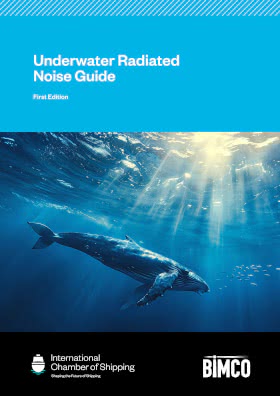
The international shipowners' associations BIMCO and International
Chamber of Shipping (ICS) have produced a guide with the aim of
help the maritime sector understand the effects and reduce the
underwater noise from ships and to help
the industry to implement the guidelines on underwater noise
of the International Maritime Organization (IMO).
Remembering that maritime transport is one of the
main sources of low-frequency underwater noise and that the
Research has shown that this noise is harmful to the
vital functions of a wide range of marine organisms, "including
marine mammals, fish and invertebrate species, from which many
coastal communities, in particular
indigenous people, depend for their food, their livelihoods
and their cultures," Michelle Sanders, representative
Permanent Representative of Canada at the IMO, stressed that 'the
reduction of subsea noise radiated by ships is not
just a question of environmental protection: it is of fundamental importance
importance of ensuring the health of the oceans."
 The new BIMCO and ICS analyses the sources of noise
and their far-reaching impact on marine life.
It also explains the content of the IMO guidelines, how to set up a
noise management plan and examines the scope of regulations
and voluntary measures. The guide also explores the
relationship between various energy efficiency measures being adopted by
part of shipping and underwater noise: various studies, including one
sponsored by the ICS, have discovered, in fact, that most of the
Part of the energy efficiency measures also reduces noise
irradiated submarine. The guide provides a comprehensive list of such
measurements together with estimates of energy efficiency and
Improvements in radiated underwater noise. 'Ships with
energy saving - observed the Secretary General and CEO of the
BIMCO, David Loosley - they are silent ships. While our
sector reduces greenhouse gas emissions through the adoption of
energy efficiency measures, including noise level
Irradiated submarine will shrink and this will help
to protect marine life and the environment".
The new BIMCO and ICS analyses the sources of noise
and their far-reaching impact on marine life.
It also explains the content of the IMO guidelines, how to set up a
noise management plan and examines the scope of regulations
and voluntary measures. The guide also explores the
relationship between various energy efficiency measures being adopted by
part of shipping and underwater noise: various studies, including one
sponsored by the ICS, have discovered, in fact, that most of the
Part of the energy efficiency measures also reduces noise
irradiated submarine. The guide provides a comprehensive list of such
measurements together with estimates of energy efficiency and
Improvements in radiated underwater noise. 'Ships with
energy saving - observed the Secretary General and CEO of the
BIMCO, David Loosley - they are silent ships. While our
sector reduces greenhouse gas emissions through the adoption of
energy efficiency measures, including noise level
Irradiated submarine will shrink and this will help
to protect marine life and the environment".